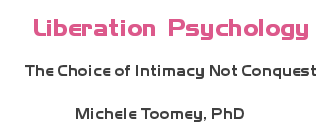Psycho-logic: Processing Psychological Information Not Analyzing or Judging It
© 1999 Michele Toomey, PhD
Processing information is a learned process, just as analyzing or judging information are learned. However, the western tradition is to analyze or judge information. Analysis uses linear logic to bring all the relevant data to an "objective" plane and then analyze it. We westerners tend to give great status to this process and those who excel in analyzing are looked up to and seen as very smart, even brilliant. Judges are allowed to have a reference line from which everything is judgmentally measured. Often they are seen as preservers of "morality" and their reference line of good or evil is not only allowed as the yardstick by which we are to be psychologically judged, but they are often allowed to punish those whom they judge immoral or unworthy.
Analyzing psychological data violates our communication network because it deems emotional data unreliable and a source of bias that taints cognitive data. Judging psychological data as opposed to evaluating it violates because it assumes some of our natural forces are evil and makes us enemies of ourselves.
Processing psychological information first means using psycho-logic not linear logic. Psycho-logic is circular because in the psychological communication network everything is relational not causal. Things relate to each other, inform each other, impact on each other, and are associated with each other. Spirals are the symbol that best capture the inner world because not only is everything relational but there is no hierarchy, no inequality, and there is no innate hostility. If the integrity of the communication network is maintained, each message is equally legitimate and needs to be considered, reflected on, evaluated and then given its place. Anything that needs to be dealt with should be dealt with as an outgrowth of the processing.
The purpose of processing information is for discovery, and as the discovery process evolves it should lead to greater understanding, first of ourselves and then of our relationship with others. As a result, good psychological processing leads to intimacy with ourselves and then with others. Self-knowledge, self-image and self-esteem that are gained through processing with integrity, have integrity. The insights and understanding that come forth lead to intimacy with ourselves, allowing us to know, and reflect, and care about ourselves, preventing self-abuse, distortion and alienation. We are then available to be known by others, allowing intimate relationships with them to occur.
Conversations, not arguments, take place, and friendships not enemies are made both within our own communication network and between ourselves and others. Psycho-logical processing is the vehicle our communication network needs in order to allow us to live in accord with our nature not violate it. Since it's a learned approach to information, we need to be willing to learn it, not just accept whatever hodge podge of approaches we informally put together as a result of our socialization.
Psycho-logical processing allows us to make associations from the past and anticipating the future that got triggered by messages we received in the present. Then, as we connect with the associations and the thoughts and feelings that accompany them, we ask ourselves what they are telling us and become self-reflective. Eventually, our reflections are evaluated and we are in a position to decide how we want to deal with what we discovered. Enriched with insight and greater understanding of ourselves in relation to the message, we are ready to move on with whatever we discovered. This process maintains our integrity and yields intimacy. |



